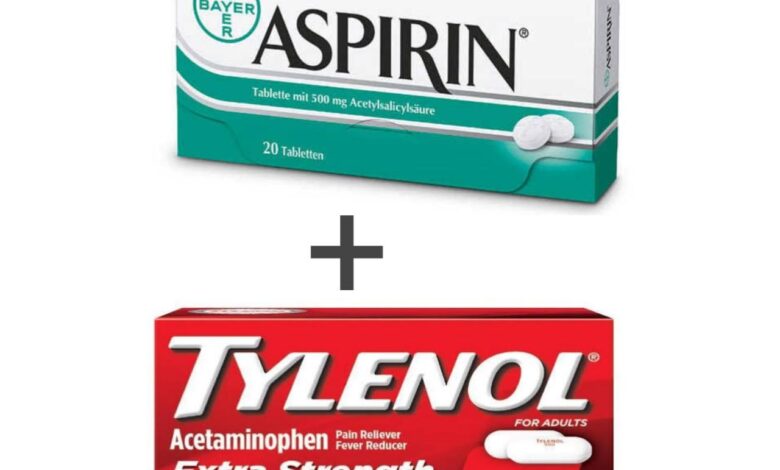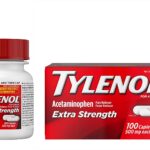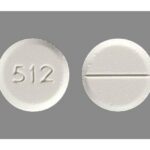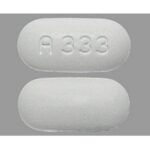Can You Take Aspirin And Tylenol Together?

Anytime you take more than one medication, or even mix it with certain foods, beverages, or over-the-counter medicines, you are at risk of a drug interaction. Most drug interactions are not serious, but because a few are, it is important to understand the possible outcome before you take your medications.
Aspirin is an everyday painkiller for aches and pains such as headache, toothache and period pain. It can also be used to treat colds and “flu-like” symptoms, and to bring down a high temperature. Tylenol on the other hand is a brand of acetaminophen in the US. Acetaminophen relieves mild-to-moderate pain, headache and fever. It is available as brand names such as Tylenol, Mapap or Panadol, and also as generics and store-specific brands.
Can you take aspirin and Tylenol together?
Yes, you can take aspirin and Tylenol together when in need of additional pain relief. In fact there are combination products that contain the two active ingredients. However, you should not take aspirin, naproxen, or ibuprofen within 8-12 hours of each other. Also, watch out for pain medications that might be included in combination products such as those used for cough and cold.
What is the most important information I should know about aspirin and Tylenol?
This medicine should not be given to a child or teenager who has a fever, especially if the child also has flu symptoms or chicken pox. Aspirin can cause a serious and sometimes fatal condition called Reye’s syndrome in children.
Do not take more of this medication than is recommended. An overdose of acetaminophen can damage your liver or cause death. Call your doctor at once if you have nausea, pain in your upper stomach, itching, loss of appetite, dark urine, clay-colored stools, or jaundice (yellowing of your skin or eyes).
Aspirin may cause stomach or intestinal bleeding, which can be fatal. Call your doctor at once if you have symptoms such as bloody or tarry stools, or coughing up blood or vomit that looks like coffee grounds.
In rare cases, acetaminophen may cause a severe skin reaction. Stop taking this medicine and call your doctor right away if you have skin redness or a rash that spreads and causes blistering and peeling.
What should I discuss with my health care provider before taking aspirin and Tylenol?
You should not use this medication if you are allergic to acetaminophen (Tylenol) or aspirin.
Do not give this medication to a child or teenager with a fever, flu symptoms, or chicken pox. Salicylates can cause Reye’s syndrome, a serious and sometimes fatal condition in children.
Ask a doctor or pharmacist if it is safe for you to take this medicine if you have:
- liver disease, cirrhosis, a history of alcoholism, or if you drink more than 3 alcoholic beverages per day;
- high blood pressure, heart disease;
- a bleeding or blood clotting disorder;
- kidney disease;
- asthma;
- gout;
- diabetes;
- a history of stomach or intestinal bleeding; or
- stomach ulcer or history of heartburn or ongoing indigestion or stomach pain.
Aspirin may cause stomach or intestinal bleeding, which can be fatal. Older adults have a higher risk of stomach bleeding.
Do not use this medication without telling your doctor if you are pregnant. Aspirin can cause harm to an unborn baby or problems with delivery if you take the medicine during the last 3 months of pregnancy. Use effective birth control, and tell your doctor if you become pregnant during treatment.
Aspirin and Tylenol can pass into breast milk and may harm a nursing baby. Tell your doctor if you are breast-feeding a baby.
Do not give this medicine to a child younger than 12 years old without the advice of a doctor.
How should I take aspirin and Tylenol?
Use combination products exactly as directed on the label, or as prescribed by your doctor. You should not take more than 8 caplets in 24 hours. Do not take this medicine for longer than recommended.
Take this medicine with a full glass of water.
Do not take more of this medication than is recommended. An overdose of this medicine can damage your liver, kidneys, lungs, and other organs, or cause death.
Call your doctor if your symptoms do not improve after 7 days of treatment, or if you have a fever lasting longer than 3 days, or any swelling or pain lasting longer than 10 days.
If you need surgery, tell the surgeon ahead of time that you are using aspirin and Tylenol. You may need to stop using the medicine for a short time.
Store at room temperature away from moisture and heat.
What happens if I miss a dose?
Since aspirin and Tylenol is taken as needed, you may not be on a dosing schedule. If you are taking the medication regularly, take the missed dose as soon as you remember. Skip the missed dose if it is almost time for your next scheduled dose. Do not take extra medicine to make up the missed dose.
What happens if I overdose?
Seek emergency medical attention or call the Poison Help line at 1-800-222-1222. An overdose of this medication can cause serious harm.
Aspirin overdose can cause ringing in your ears, dizziness, vomiting, diarrhea, increased sweating, confusion, hallucinations, rapid breathing, seizure (convulsions), or coma.
The first signs of an acetaminophen overdose include loss of appetite, nausea, vomiting, stomach pain, sweating, and confusion or weakness. Later symptoms may include pain in your upper stomach, dark urine, and yellowing of your skin or the whites of your eyes.
What should I avoid while taking aspirin and Tylenol?
Avoid drinking alcohol. It may increase your risk of stomach bleeding or liver damage while you are taking aspirin and Tylenol. Ask a doctor before taking acetaminophen if you drink more than 3 alcoholic beverages per day.
Ask a doctor or pharmacist before using any other cold, allergy, pain, or sleep medication. Acetaminophen (sometimes abbreviated as “APAP”) and aspirin are contained in many combination medicines. Taking certain products together can cause you to get too much of a certain drug, which can lead to a fatal overdose. Check the label to see if a medicine contains aspirin, acetaminophen, or APAP.
Aspirin and Tylenol side effects
Get emergency medical help if you have any of these signs of an allergic reaction: hives; difficulty breathing; swelling of your face, lips, tongue, or throat.
In rare cases, acetaminophen may cause a severe skin reaction that can be fatal. This could occur even if you have taken acetaminophen in the past and had no reaction. Stop taking this medicine and call your doctor right away if you have skin redness or a rash that spreads and causes blistering and peeling. If you have this type of reaction, you should never again take any medicine that contains acetaminophen.





